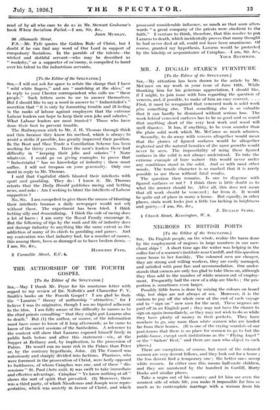THE AUTHORSHIP OF THE FOURTH GOSPEL
[To the Editor of the SPECTATOR.]
SIR,—May I thank Mr. Fryer for his courteous letter with regard to my review of Dr. Nolloth's and Chancellor P. V. Smith's books on the Fourth Gospel ? I am glad he finds the " Lazarus " theory of authorship "attractive," for I believe I was its originator, though I am no bigoted adherent to the idea. I am fully aware of the difficulty he names as to the chief priests consulting " that they might put Lazarus also to death." But (1) the author, or source, of the information must have come to know of it long afterwards, as he carne to know of the secret sessions of the Sanliedrim. A reference to the context will show that Lazarus exposed himself freely in public both before and after this statement—viz., at the Supper at Bethany and, by implication, in the procession of Palms. He would run no more risk in the Palace than Peter or,. by the contrary hypothesis, John. (2) The Council was notoriously and sharply divided into factions. Pharisees, who were foremost in the prosecution of Christ, were hotly opposed to Sidducees, of whom Caiaphas was one, and of these" dis- sensions " St. Paul (Acts xxiii. 6) was swift to take immediate and effective advantage. Caiaphas' "Ye know nothing at all" shows the sort of spirit that prevailed. (3) Moreover, there was a third party, of which Nicoderrnis and Joseph were repre- aeniatiVe, which was secretly in favour of Christ, and which possessed considerable influence, so much so that soon after- wards "a great company of the priests were obedient to the faith." I-Venture to think, therefore, that this resolve to put Lazarus to death, which incidentally proves that many thought he had never died at all, could not have been unanimous. Of course, granted my hypothesis, Lazarus would be protected by the kinship or acquaintance of Caiaphas.—I am, Sir, &c., YOUR REVIEWER.










































 Previous page
Previous page